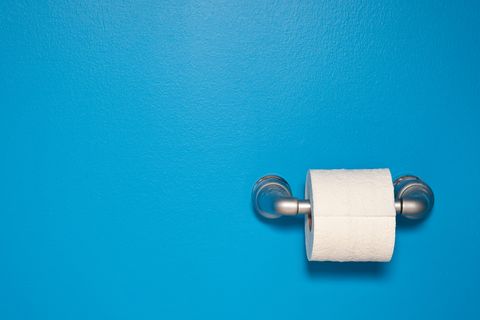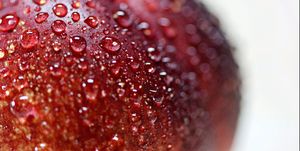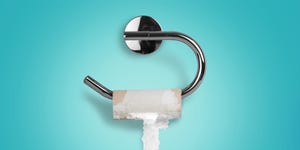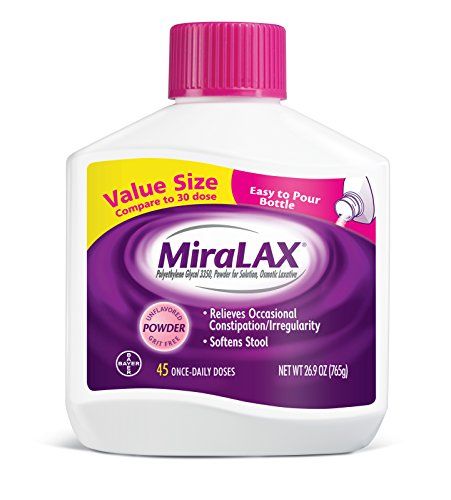
Let’s be really, totally, super honest: Few things in life feel as good, as satisfying, as downright cleansing as a good poop. Most of the time, your daily #2 instantly makes you feel lighter, happier, more relieved, and less bloated (praise ‘effing be).
But uh, what if your time in the bathroom doesn’t feel good? What if…it actually hurts?
“This is a pretty common complaint,” says Rabia De Latour, M.D., gastroenterologist and assistant professor of medicine at NYU Langone Health. “Unfortunately, many women feel embarrassed talking about these symptoms, so they go underreported and untreated. But trust me, it’s not uncommon at all.”
So, whew for that—but that still doesn’t explain why your poops hurt so damn much. Here’s what might be going on if you legit dread going to the bathroom. (And, as always, see your doctor or snag a gastroenterologist’s opinion if you’re experiencing any of this stuff on the reg.)
1. You have hemorrhoids.
There are two kinds of hemorrhoids: internal and external. “A hemorrhoid is essentially a vein that’s inside your rectum and becomes dilated,” explains De Latour.
While both internal and external hemorrhoids can happen for many reasons, the most common reasons are weight gain and pregnancy, both of which lead to increased pressure and stress above the vein. “When the pressure builds in that area, the thin-walled veins around the rectum become dilated,” De Latour says.

“Internal hemorrhoids shouldn’t be painful, though they may bleed,” says De Latour. “But external hemorrhoids, which you’ll find on the edge of the anus, can be exquisitely painful and itchy.”
The key to preventing hemorrhoids is to maintain a healthy weight, avoid rapid weight gain, and include plenty of fiber in your diet. The good news is that usually hemorrhoids aren’t serious or dangerous, and topical creams can help treat symptoms of external hemorrhoids (you’ll have to see your gastroenterologist for internal ones).
2. You have fissures.
A fissure is a tear in the skin of the anus. And if it sounds painful, well, that’s because it is. “That area of the body is very sensitive,” says De Latour.
These anal fissures can happen after local trauma, due to anything from passing a hard bowel movement, to engaging in anal sex, to giving birth vaginally, or even administering an enema incorrectly.
You’ll know you have an anal fissure if you experience pain during or after your bowel movements (poop passing by an open wound = serious ouch), if you see bright red blood accompanying your stool or on your toilet paper, or you can visibly see a crack or tear in the skin surrounding the anus (though it may be easier to enlist a doctor or very, very close loved one to assess that for you). The best way to prevent fissures is to consume plenty of fiber so you have regular, easy bowel movements.
3. You’re constipated.
Constipation is most often caused by dietary factors: Either you’re not eating enough fiber or you’re not drinking enough water and are dehydrated.
“If you’re dehydrated, your colon is going to suck up all the water from the stool it’s forming,” says De Latour. “As a result, you’re going to have hard, painful poops. And when that happens, it’s harder for them to pass through the anal canal.”
And when that happens, it can cause strain on the muscles in your pelvic area, resulting in pain. Again, De Latour says, the solution is fiber. Stool softeners can help, she says (De Latour prefers Colace and Miralax), but they’re not a long-term solution.
4. You have proctitis
Proctitis is a scary-sounding word for an inflamed rectum. It can be caused by ulcerative colitis or Crohn’s disease (both inflammatory bowel diseases), sexually transmitted diseases like syphilis and chlamydia, or inflammation from an enema you didn’t respond well to.
The rectum is the last part of the colon before the anus, so when it’s inflamed, it’s harder for stool to pass through. “The treatment depends on the cause,” De Latour says, so you’ll need to see a doctor to figure out why you’re experiencing inflammation. “With inflammatory bowel diseases, we may treat with anti-inflammatory medications,” she explains. “But if you have an infection, we’ll need to treat the infection itself, often with antibiotics.”
5. You have an inflammatory bowel disease.
If you have ulcerative colitis, Crohn’s disease, or even irritable bowel syndrome, you probably experience excessive diarrhea. And thanks to a constant flow through the anal canal, you’re likely to end up with irritation and pain. “Your gastroenterologist will want to give you an exam to test for abscesses and pus, which can be very painful,” De Latour says.
6. You’re just pooping a whole lot.
“Everyone, at some point, gets diarrhea,” De Latour says. “And if you have lots of bowel movements in a short period of time, you’re constantly wiping and cleaning the anal area, which will become irritated and sensitive.”

In this instance, De Latour says to avoid topical creams and instead use a lot of water to keep the area clean. Excessive wiping will lead to further irritation (think of a baby getting diaper rash—this is the grown-up version of that), so be extra gentle with the area. (Now may be the time to hit up Amazon and invest in a bidet attachment for your toilet—seriously; it cuts down on wiping and cleanses the area with water. Win-win.)
7. You have endometriosis.
If you experience severely painful bowel movements during your menstrual cycle, that may be a sign of endometriosis. “If this is the case, see your gynecologist,” De Latour says. “Some women with endometriosis have endometrial implants in their colon, which leads to pain and bleeding. It’s not that common, but it can happen.”
8. You had anal sex recently—or unprotected anal sex even once.
If you’re new to anal sex, you may simply be sore from penetrating an area that’s new-to-you in the penetration department.
But De Latour says she sees “a fair share of patients” who contract rectal STDs from engaging in anal sex. “It can look like inflammatory bowel disease—then I find out they had unprotected anal sex and got chlamydia or syphilis,” which can cause localized inflammation, she says.

Basically, “always use protection, know your partner’s STD status, and avoid painful situations,” De Latour says. “If you feel pain, you may be causing trauma, so know and respect your limitations.”
9. You have HPV, anal cancer, or rectal cancer.
First, you probably don’t. So don’t skip reasons one through eight above and immediately assume your painful poop is a sign of cancer. But, De Latour says, there has been a recent increase in the United States of younger patients—ones in their thirties—presenting with rectal cancer. (And HPV can cause both cervical and anal cancer.) “It’s a concerning epidemic, so keep your Spidey senses up,” De Latour says, and watch out for other symptoms with your painful poop, like noticeable weight loss, that might be a sign of a greater issue.
Source: Read Full Article
